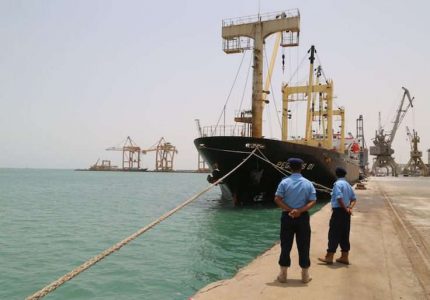
Iranian terrorists demand $80 million to stop the mass ecological disaster
Iranian-backed Houthi terrorists in Yemen are demanding tens of millions of dollars in ransom cash to permit environmentalists to rescue a “structurally deteriorating” offshore oil tanker and prevent a humanitarian disaster that would be far worse than the 1989 Exxon Valdez spill, in a tense standoff that critics are likening to “eco-terrorism.”
At this point, no one has agreed to pay off the Houthis, though the demand for hard cash is not inconceivable given the scant global blowback the Obama administration received in 2015 when it sent $1.7 billion in cash pallets to Tehran in order to secure freedom for several Americans imprisoned there.
Deploying a ransom tactic used by their Iranian patrons, the Houthi rebels are demanding $80 million to permit United Nations teams to inspect the deserted SAFER tanker, which has been stranded in waters near Yemen and is viewed by experts as a “floating bomb.”
With the potential for a large-scale ecological disaster growing by the day, the Houthi rebels continue to block all access to the stranded tanker, setting the stage for a tense showdown between the Iranian-backed militants and the international community.
The SAFER Floating Storage and Offloading export terminal, known as FSO, is a single-hulled oil tanker that first began operating in 1988. Owned and managed by Yemen’s national SAFER Exploration and Production Operations Company, the vessel has 34 crude oil tanks of various sizes, totaling some 3 million barrels of oil.
Experts at the Atlantic Council have described the tanker as a “floating bomb” and have warned that the risk of a lethal explosion and oil spill increases each day. The environmental repercussions would be devastating, tainting the drinking water for millions of people living along the Red Sea coast.
In the event of a catastrophe, global experts estimate the damage could be “four times worse” than the Exxon Valdez explosion and send shockwaves through the global economy. It also could destroy one of the most renowned coral reefs in the world.
“Such an incident could have a far-reaching and highly destructive range of effects: desalinization plants contaminated, depriving tens of millions of people, some already on the brink of famine, of access to clean drinking water; the loss of marine ecosystems that may be the key to saving the rest of the world’s coral from warming seas; millions of desperate Yemenis literally starved for international aid because port facilities are unusable; tangible impact on the global economy from the temporary closure of Red Sea shipping lanes; armed conflict over basic necessities; and a downward spiral in an already fragile region,” according to the Atlantic Council. “Those are all possible consequences of a million-barrel oil spill in the Red Sea.”
“There is no vessel more likely to precipitate such a multidimensional crisis than the SAFER, which continues to decay despite continuous efforts to negotiate a way to secure the vast quantity of crude oil in its storage tanks,” the think tank warned.
Despite these catastrophic repercussions, the increasingly violent Houthis continue to block access to the site.
Last week, U.N. Humanitarian Affairs Coordinator Mark Lowcock told the international body’s Security Council that the Iran-backed Houthi rebels continue to block a U.N. risk assessment team from accessing the SAFER.
“Ansar Allah authorities also continue to delay a UN technical assessment of the decaying SAFER tanker, which as I have told you many times before, threatens to spill up to 1.1 million barrels of oil into the Red Sea,” Lowcock warned at the time.
Despite the Houthis’ increased brazenness, their acts of violence have largely escaped scrutiny in Western media and among close Yemen watchers on Capitol Hill.
Earlier this week, after several rockets struck a market in northern Yemen, a number of news articles attributed the attack to the Saudi coalition battling the Houthis.
Those stories prompted official complaints from at least one congressional committee chairman, an individual familiar with the correspondence told the Washington Free Beacon.
However, after the Saudi-led coalition and Yemen’s government contested the media accounts and insisted that the deaths occurred after the Houthis fired Katyusha rockets on the marketplace, the committee chairman was no longer interested, sources said. Media interest also dropped, and the deaths of at least 14 individuals receded from leading news sources.
Requests for comment on the situation sent to the State Department were not returned by press time.
Source: Free Bacon





